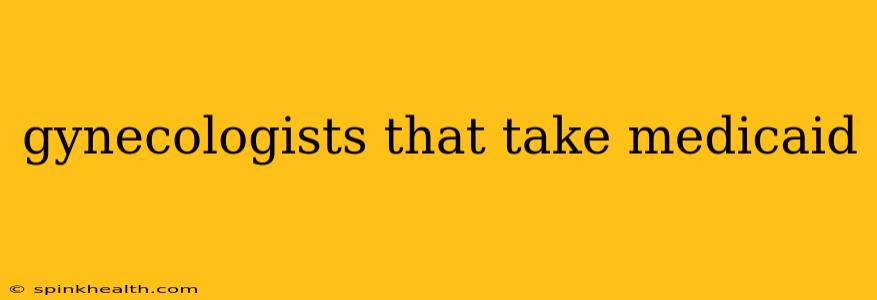Navigating the healthcare system can feel like a maze, especially when you're trying to find a specialist who accepts your insurance. Finding a gynecologist who takes Medicaid adds another layer of complexity. But don't worry, this guide is here to help you on your journey to finding the right care. Let's start this story.
Imagine Sarah, a young woman starting her journey into adulthood. She needs a gynecologist, but her insurance is Medicaid. The thought of finding a doctor who accepts her plan fills her with anxiety. This is a common experience, but finding the right care is entirely possible. This story isn't just about Sarah; it's about empowering you to navigate this process successfully.
How to Find Gynecologists Who Accept Medicaid
The first step in Sarah's, and your, journey is to utilize the resources available. There are several avenues to explore:
1. Your State's Medicaid Website: Each state manages its Medicaid program differently. Your state's official Medicaid website is a goldmine of information. Look for a provider search tool. These tools usually allow you to filter by specialty (gynecology), location, and acceptance of Medicaid. This is often the most reliable source of information.
2. The Medicaid Managed Care Organization (MCO): If your Medicaid benefits are managed through an MCO, they have a provider directory. This directory lists doctors within their network who accept Medicaid. You can usually access this online or by contacting their customer service.
3. Online Doctor Search Engines: Websites like Zocdoc, Healthgrades, and Vitals allow you to search for doctors based on insurance, location, and specialty. Remember to filter your search specifically to include "Medicaid acceptance" or similar terms to narrow down your options. However, always verify the information found on these sites with the doctor's office directly.
4. Local Health Clinics and Federally Qualified Health Centers (FQHCs): These clinics often provide comprehensive healthcare services, including gynecological care, and accept Medicaid. They are a fantastic option for affordable and accessible care. A simple online search for "FQHC near me" will yield local results.
5. Asking for Recommendations: Don't underestimate the power of word-of-mouth! Ask friends, family, or your primary care physician for recommendations. They might know a gynecologist who accepts Medicaid and has a good reputation.
What Questions Should You Ask Potential Gynecologists?
Once you've identified potential gynecologists, it’s crucial to confirm that they accept your specific Medicaid plan. Don't hesitate to contact their office directly to confirm. Here are a few essential questions to ask:
1. Do you accept my specific Medicaid plan? Medicaid plans vary by state and even within a state. Confirming they accept your specific plan is paramount.
2. What are your fees for services not covered by Medicaid? Some services might not be fully covered by Medicaid. Understanding potential out-of-pocket costs upfront is crucial for budgeting.
3. What is your appointment scheduling process? Understanding how to book appointments, manage cancellations, and the overall process will help make your experience smoother.
4. What are your office hours? Ensuring the office hours work with your schedule is important for convenient access to care.
5. What are your policies on telehealth or virtual appointments? Many providers now offer telehealth options, which can be particularly convenient.
Are there specific services for Medicaid recipients?
Many health clinics and FQHCs offer expanded services for Medicaid patients. These might include:
-
Preventive care: Regular checkups, screenings, and vaccinations are crucial for women's health. Medicaid often covers these services.
-
Family planning services: Access to birth control, counseling, and other reproductive health services is often available.
-
Maternal care: Comprehensive care throughout pregnancy and postpartum is critical.
Finding the Right Fit: It's More Than Just Insurance
While finding a gynecologist who accepts Medicaid is the first hurdle, it's not the only factor to consider. It's equally important to find a doctor you feel comfortable with and trust. Consider factors like the doctor's bedside manner, communication style, and overall approach to patient care. Choosing a provider who meets your individual needs is essential for a positive healthcare experience. Remember, Sarah's journey—and yours—is about finding the right care, not just any care. Take your time, ask questions, and trust your intuition. With a little persistence, you'll find the perfect gynecologist for your needs.

